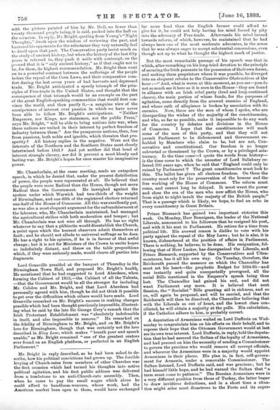Mr. Bright in reply described, as he had been asked
to de- scribe, how his political convictions had grown up. The forcible levying of Church-rates from members of other Churches was the first occasion which had turned his thoughts into active political agitation, and his first public address was delivered from a tombstone to an anti-Church-rate assembly. Then, when he came to pay the small wages which alone he could. afford to handloom.weavers, whose work, had the American market been open to them, would have exchanged far more food than the English farmer could afford to- give for it, he could not help having his mind forced by pity into the advocacy of Free-trade. Afterwards his mind turned towards reform, of which, however, he maintained that he had always been one of the most moderate advocates, in the sense that he was always eager to accept substantial concessions, even though not up to what he thought the highest mark of justice.


































 Previous page
Previous page